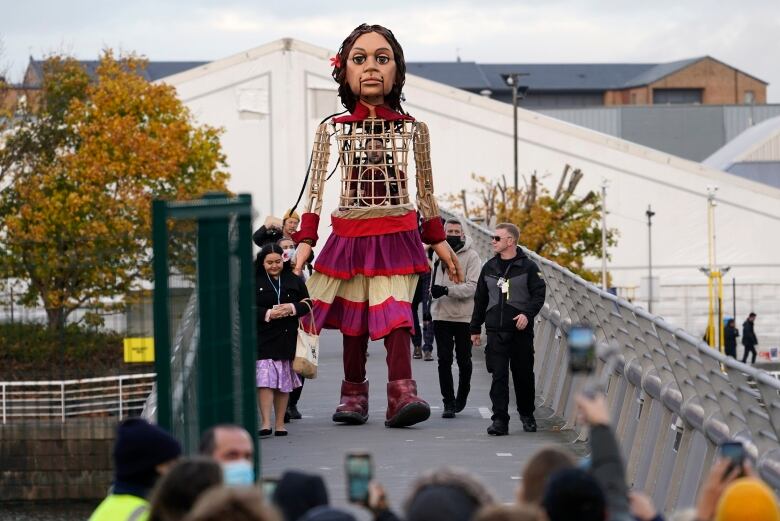Our planet is changing. So is our journalism. This story is part of a CBC News initiative entitled Our Changing Planet to show and explain the effects of climate change and what is being done about it.
The British hosts of the UN climate summit in Glasgow have proposed that countries raise their ambitions to slash greenhouse gas emissions by the end of 2022 in a draft political decision that nations will negotiate over the next few days.
The proposal underscores the concerns of climate experts and activists that there is a yawning gap between current national pledges and the kinds of cuts required to keep the world from tilting into a full-blown climate crisis.
The U.K.’s COP26 president, Alok Sharma, had said on Tuesday that negotiators have a “mountain to climb” to come up with a deal sufficient to address the threat from global warming.
- Have questions about COP26 or climate science, policy or politics? Email us: [email protected]. Your input helps inform our coverage.
The first draft of the COP26 political decision, which the United Nations released on Wednesday morning, asks countries to “revisit and strengthen the 2030 targets in their nationally determined contributions, as necessary to align with the Paris Agreement temperature goal by the end of 2022.”
Under the 2015 Paris Agreement, countries agreed to limit global warming to well below 2 C above pre-industrial levels and try to cap it at 1.5 C above pre-industrial levels.

Beyond this threshold, scientists say the sea level rises and increasing floods, droughts, wildfires and storms already being experienced will become catastrophic and potentially irreversible.
Takes aim at coal
The draft also urged countries to phase out coal, oil and gas subsidies — taking direct aim at the burning of coal, oil and gas that produces carbon dioxide, the primary contributor to man-made climate change. It did not set a fixed date for phasing them out.
Diplomats from the nearly 200 countries represented at COP26 sit down on Wednesday to negotiate a final text they are all willing to sign when the summit ends this weekend. The Conference of Parties (COP), as it’s known, meets every year and is the global decision-making body set up in the early 1990s to implement the United Nations Framework Convention on Climate Change and subsequent climate agreements.
Environmental group Greenpeace slammed the draft as inadequate: “This draft deal is not a plan to solve the climate crisis, it’s an agreement that we’ll all cross our fingers and hope for the best. It’s a polite request that countries maybe, possibly, do more next year.”
The Climate Action Tracker (CAT) research group said on Tuesday that all the national pledges submitted so far to cut greenhouse gases by 2030 would allow the Earth’s temperature to rise 2.4 C from pre-industrial levels by 2100.

The draft document reminds countries that to stop the planet heating beyond the critical 1.5 C threshold, global CO2 emissions must drop 45 per cent by 2030 from 2010 levels.
Under the national climate pledges submitted to the United Nations so far, emissions will be 14 per cent above 2010 levels by 2030.
The draft asks countries to submit improved pledges next year, but does not confirm if this will become an annual requirement — potentially leaving a decision on future reviews to Egypt, which will host the next UN climate conference.
Pushback expected
Some states have said annual reviews would be too frequent and too taxing for countries with limited government resources.
The draft’s call to halt subsidies for fossil fuels is also likely to face pushback from big producers.
Alongside the need to cut emissions faster, a core aim of COP26 is to increase the provision of climate finance — money given by rich countries, whose greenhouse gas emissions are largely responsible for climate change, to poorer countries to help them cope with increasingly disastrous climate impacts and cut their own emissions.
The draft “urges” developed countries to “urgently scale up” this support, and says more of it needs to take the form of grants, rather than loans that burden poor nations with more debt.
It does not set out specific new targets for climate finance or a new plan to ensure the money arrives.





More Stories
Satellite built by N.B. students not responding a week after entering Earth’s orbit | Globalnews.ca
Cisco reveals security breach, warns of state-sponsored spy campaign
Ingenuity Mars Helicopter down but definitely not out | CBC Radio